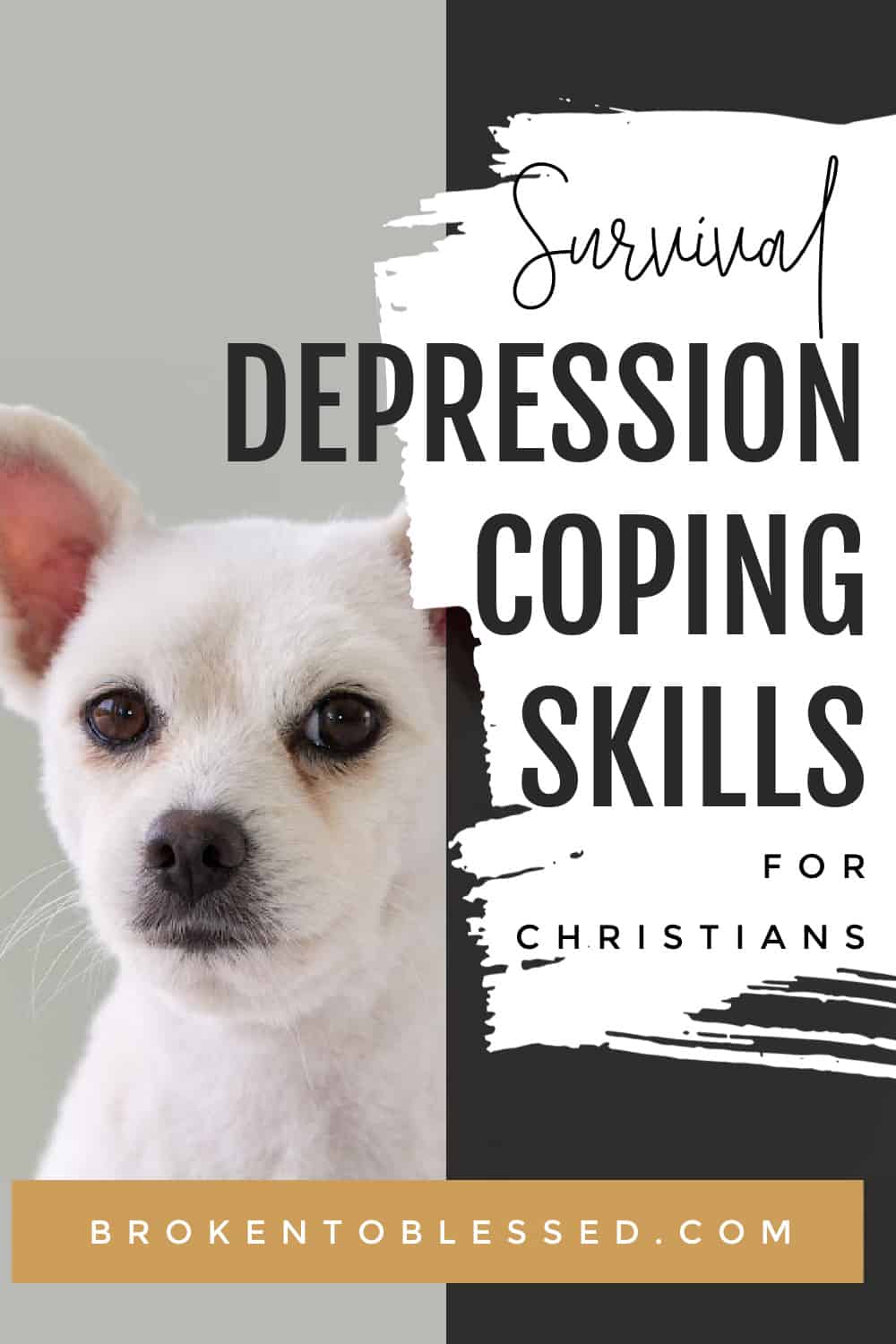Survival Depression Coping Skills When You Feel At Your Lowest
Dealing with depression can kick us into survival mode– sometimes we feel like we can barely make it through the day, and minutes can feel like hours. Depression really is like a heavy weight. If we’re not careful, we can sink deeper into depression or even get addicted to the wrong type of coping.
In this article, we’re going to discuss short-term (quick fix) and long-term depression coping skills and strategies. You can look at it as your backpack of reliable tools that you can go to again and again. Still, understanding the differences between the two is key for lasting change and spiritual growth.
For more on depression, check out Breakthrough Bible Verses for Depression and Hopelessness, How to Survive Seasonal Depression During the Holidays, and How to Stop Worrying and Give Your Worries to God

Are you depressed? Here’s the signs
Wondering if you really have Depression (with a capital D)? Most people who suffer from depression don’t need a list to confirm this, however, checking the symptoms below may shed some light on behavior you may not have realized is linked to your depression.
Check out this list below for some telltale signs that you’re suffering from depression.
The symptoms of depression are:
- Hard time remembering things, concentrating and making decisions
- Fatigue
- Guilt
- Low self-esteem/ feeling of worthlessness and powerlessness
- Always pessimistic
- Insomnia or sleeping too much
- Always annoyed and grumpy
- Loss of interest in previously pleasurable activities
- Eating disorders
- Body pain such as persistent pains, headaches, pains, or cramps
- Digestive problems
- Suicide attempts or suicidal thoughts
How have you been coping with depression?
Whether you realize it or not, over time you’ve developed depression coping skills. This is just a way your mind tries to manage stressful situations (internal or external).
These coping skills can be healthy or destructive. An example of a healthy coping skill would be seeking help from a trusted friend or mentor; an example of a destructive coping skill is using drugs or alcohol to mask the pain of depression. How have you been coping with your depression?
Below are some healthy ways we can cope with our depression. The key is to understand the differences between short-term relief and long-term solutions.
Short-term relief (or quick fixes), are tools we use when we are trying to shift our mindset in the moment. They are not necessarily strategies that should be relied on for long-term management, or to resolve the depression. Visually, we can think of this like a band-aid.
Long-term solutions are strategies that take time. This is like having a cast on a broken bone– at first we won’t see a difference, but after some time, the bone will begin to heal. It is crucial that we get to the root of our depression, to work on it, to heal it.
Depression coping skills and strategies
Short term (quick fix) strategies:
Here are a few tools to use in the moment. Study over these and determine what you’re go-to will be the next time you feel depressed. It’s important to remember that not all of these are lasting solutions– the point is that we must learn how to redirect our thought patterns and seek out healthier ways to cope.
- Get out of your head. Depression occurs when we are too focused on ourselves, having the mindset of self-serving instead of others-serving. When you find yourself hyper-focused on your feelings, disappointments, and shortcomings, look for ways you can serve or help others in the moment.
- Express your love language. The 5 love languages have been described as the 5 ways people receive and express love. They include words of affirmation, quality time, physical touch, acts of service, and gifts. There are definitely destructive ways we can practice these “languages,” but when you feel the depression coming on, look for ways to express your love language in a healthy way. For example, physical touch can be very destructive (with a “give me” or lust attitude), but we can express it in a healthy way by giving and receiving hugs from family, or snuggling up with our favorite dog. You could also give a gift to someone, do a chore for your spouse, donate your time to help someone else, or call a friend and lift them up in prayer.
- Go to your Bible. Yes, really. I know this can be challenging to pick up your Bible in times of distress, but truthfully, we can find enormous strength in those pages. Don’t know where to turn to? Try reading stories about people who suffered greatly and experienced depression: Job, David (1 and 2 Samuel), Esther, Jonah, and Moses (to name a few). What their stories remind us is that, although we will face struggles and seasons of great pain, we will make it through with God. Read your Bible in the moment of a depression spell, as well as long-term. We should all be in our Bible daily!
- Get funny. In times of sadness, media can either be a harmful coping skill, or a healthy one. Research shows that watching a funny movie can be relaxing and reduce stress. Laughter can help boost your mood and get you into a different head space.
- Prayer and meditation. Prayer is one of our most valuable tools as Christians– in the short and long term. Going to the Father with your depression isn’t just a good idea, it’s Biblical. “Casting all your cares upon Him, for He cares for you” (1 Peter 5:7). Pray to the Lord about your depression, and that He may show you the steps you need to take to overcome it. Meditate on the Word, filling your mind with Scripture to battle your depression. It’s the sword of the Spirit!
Long term strategies:
Here are a few depression coping skills that you can work on to create lasting change. These methods will take time. However, consistency and a desire to overcome our depression is crucial. Notice too, that many of these strategies involve outside help, because we don’t need to do this alone. Depression is isolating, and we need to break that habit.
- Understand your triggers. Knowing what triggers your depression is vital for overcoming it. Once we understand HOW we get into that state, we can then focus on strategies to change. Sometimes this can be done on your own, and other times you need the help of a professional. One way we can keep track and uncover our triggers is through writing. If you don’t like the idea of keeping a journal, even just writing down some bullet points can help you when you’re reflecting back on what made you depressed in the first place.
- “Put off, Put on” (POPO) Principle. This principle is based on Ephesians 4, which is about “putting off” the old and “putting on” the new.The old is our sin struggles, and the harmful ways we’ve been trying to deal with our problems. Putting on the new is God’s design for change to take place in our lives. When it comes to depression, we want to “put off” our destructive desires, and instead, “put on” righteous desires: trusting the Lord in our suffering, hoping in God, and valuing spiritual growth over our own comfort. This is something that takes time. For more on the POPO Principle, listen to my podcast episode on this.
- Book an appointment with a Biblical counselor. Anyone who’s suffered from depression for a considerable length of time knows that it can be a hard mindset to break. That’s when we seek out Biblical counsel to help us through. I say Biblical, because depression is a spiritual battle. And if you’re a Christian, going to a worldly counselor will only bring you worldly solutions– these solutions many times are only temporary, but God and His word provide everlasting solutions. Biblical counseling can help remind us of God’s promises. It can undeniably provide comfort that we don’t have to deal with our depression alone.
- Massage therapy. In addition to Biblical counseling, receiving regular massage through a professional massage therapist can help us reduce stress. Tension and trauma impacts our bodies, and massage therapy provides healing in the areas we carry stress. This is a wonderful tool to use side by side with counseling. It’s truly a way we can be working on our bodies, as well as the mind.
- Attend church and become involved with events. Spiritually, we are not meant to walk the Christian walk alone. Being part of a body of believers will impact our spiritual life in a positive way. As Christians, we are there to help each other, providing support through our suffering. Plug into a local church and participate in events to bring a feeling of belonging and community. It will help shift your perspective from a self-serving to an others-serving mindset.

Final thoughts
Truly, to overcome depression, we need to develop healthy coping skills, instead of relying on destructive ones. Above I listed both short-term and long-term strategies. Remember that we need to focus on mind, body, and spirit for long-lasting change.
I pray that you incorporate these strategies into your life. Depression is no joke, and it can be a tough battle. But with God, with Jesus, all things are possible. That includes freedom from the bondage of depression.
Psalms 42:5 tells us: “Why are you cast down, O my soul, and why are you in turmoil within me? Hope in God; for I shall again praise him, my salvation.”
Let’s praise Him.

Share This

Disclaimer
Any mental health information contained within this post is for general purposes only. It is not in any way a substitute for specific medical advice. You must therefore obtain the relevant professional or specialist advice before taking, or refraining from, any action based on the information in these webpages.
If you are in crisis or you think you may have an emergency, call your doctor or 911 immediately.


